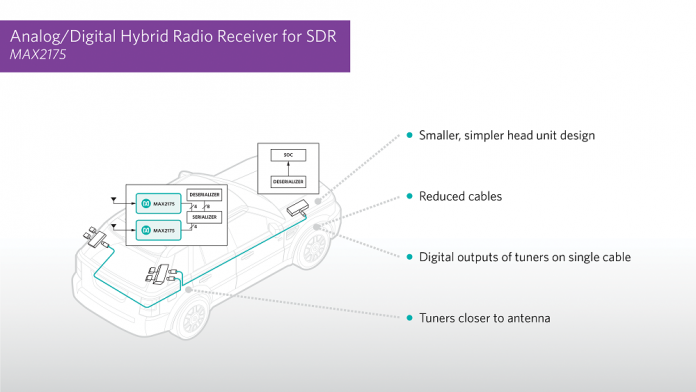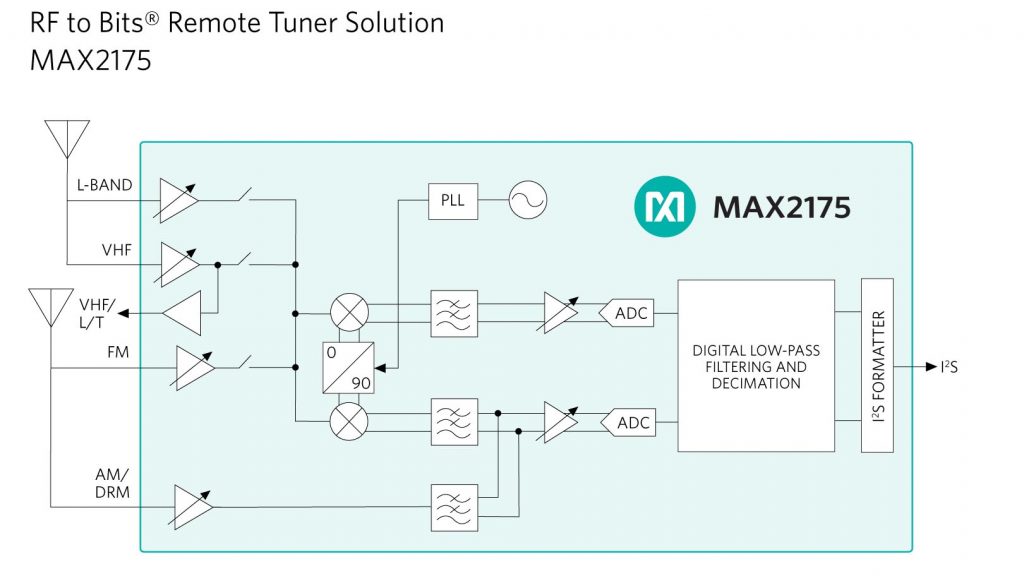MAX2175 RF to Bits® tuner-based solution reduces cables and simplifies vehicle head unit design
Using the remote tuner solution from Maxim Integrated Products, Inc., designers can significantly simplify the head unit design of a vehicle and reduce cables. The MAX2175 RF to Bits tuner within the solution eliminates the need to rework the vehicle’s hardware to support worldwide radio standards, allowing updates by simply changing the vehicle’s software.
- View details about Maxim’s remote tuner solution, including a video: http://bit.ly/Remote_Tuner_Solution_Maxim
- For more information about the MAX2175, visit: http://bit.ly/MAX2175_Maxim
- Download a schematic: http://bit.ly/MAX2175_Schematic_Maxim
Traditional radio architecture brings many challenges to vehicle designers. The vehicle’s complex head unit must accommodate multiple tuners, manage heat
dissipation, and receive multiple cables from the antennas. In addition, the received analog signals pick up noise as they travel from the antenna to the head unit
of the vehicle. Finally, baseband processing uses single purpose hardware, requiring separate designs to support multiple worldwide radio standards.
With Maxim’s remote tuner solution, the RF to Bits tuners are now located in a quieter environment close to the antenna to minimize noise. Meanwhile, the digital outputs of the tuners are serialized using Maxim’s gigabit multimedia serial link (GMSL) serializer and deserializer (SerDes) onto a single low-cost coax cable. Power for the remote tuner solution is also delivered on this single cable. Not only does this improve radio performance, but it also reduces the weight of the vehicle to provide better mileage. Removing all tuners from the head unit saves space and reduces both system complexity and heat dissipation in the head unit. In a 4-channel radio, for example, 4W of power can be removed from the head unit. In addition, the MAX2175 allows the baseband processing to be done in software on an automotive System-on-Chip (SoC), such as the Renesas Electronics R-Car H3 SoC. This software defined radio (SDR) approach enables flexible implementations by eliminating the need for a dedicated baseband processor. By simply changing the software, now any worldwide radio standard can be supported using the MAX2175.
Key Advantages
- Design flexibility and scalability: Rather than having to redesign the head unit, designers can now optimize a single remote radio tuner architecture that scales to different use cases by managing the number of remote tuners; Simply change software to support any worldwide radio standard
- Ease of design and space savings: Replacing multiple tuners with a deserializer connected to the SoC reduces system complexity, space, and heat dissipation in the head unit; Available in a 48-pin 7mm x 7mm TQFN package (-40-degree Celsius to +85-degree Celsius temperature range)
- Enhanced radio performance: Tuners are brought closer to the antenna; digital rather than analog signals are used for a clearer signal
- Improved vehicle mileage: Reduced number of cables reduces the weight of the cable harness
Maxim’s Remote Tuner Solution includes the following Maxim products:
- MAX2175 analog/digital hybrid radio receiver with RF to Bits front-end
- MAX96708 14-bit GMSL deserializer
- MAX96711 14-bit GMSL serializer
- MAX15027 1A, low-dropout linear regulator
- MAX20002 36V, 2A, synchronous buck converter
Commentary
- “By providing OEMs with a solution to reduce the number of cables, we also provide them with space savings, ease of design, and improved performance,” said William Chu, Managing Director of Automotive at Maxim Integrated. “Maxim is the only company providing all three components of RF, SerDes, and power in its solution.”
- “The comprehensive set of Core Development Kits (CDKs) for software-defined digital radio solutions from Fraunhofer IIS are specifically designed for best-in-class performance,” said Martin Speitel, head of the Infotainment group at Fraunhofer IIS. “Together with Maxim, we developed a complete software defined radio solution which demonstrates a clearer radio signal for automotive applications.”
- “The software-defined approach is the future of in-vehicle electronics, and it is already on its way,” said Luca De Ambroggi, principal analyst for automotive semiconductors at IHS Markit Technology. “I see electronic systems in cars becoming like powerful personal computers. And, like with a PC, if you want to add new functionalities you download and install a software program. Your hardware doesn’t need to change.¹”
Availability and Pricing
- Evaluation kits are available: MAX2175R1EVKIT#; MAX2175J1EVKIT#
- Pricing for MAX2175 and EV kits are available upon request
¹ Information based on IHS Markit Technology Automotive Semiconductor Market Tracker, 2016. Information is not an endorsement of Espial or ARRIS International, plc. Any reliance on these results is at the third party’s own risk. Visit https://technology.ihs.com for more details.









